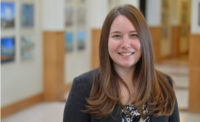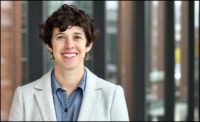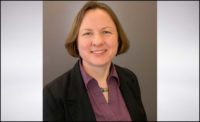Name: Sarah Gudeman
Age: 36
Title: P.E., CEM, WELL AP, LEED AP BD+C, mechanical engineer, director of sustainability, Morrissey Engineering Inc.
Educational Experience: Bachelor’s degree in mechanical engineering from Iowa State University.
Professional Credentials/Accreditations: Registered P.E. in Nebraska and Iowa; LEED Accredited Professional: Building Design + Construction (LEED AP-BD+C); Building Science Thermographer; Certified Energy Manager (CEM); WELL Accredited Professional (WELL AP), WELL Performance Testing Agent (WELL PT Agent); WELL Faculty; and Fitwel Ambassador.
What caused you to/when did you fall in love with engineering?
Like so many people, I fell into engineering from an inclination toward math and science. Going to an all-girls high school that focused on academics certainly helped (Marian High School) as did a certain physics teacher who’s mantra of “women can be engineers” still rings in my head. At the time, I admittedly didn’t know what he was talking about, though. What I [thought] I knew about engineering was that I didn’t want to build bridges. This is why I apparently didn’t end up as a structural engineer. My parents also tell stories of us buying used appliances at second-hand stores so I could take them apart; or when I was trying to decide between majoring in art or engineering — guess which one they guided me toward? Ultimately, I love developing unique and improved solutions to problems of all types, which is engineering at its core.
What has been the most rewarding aspect of working in the skilled trades?
In this industry, people have great pride in their work. My husband is a plumber, and I get to see firsthand the dedication and drive required on the “implementation” side of engineering design in the building industry. It’s a unique perspective, and one I always appreciate. The work we do as designers ultimately hinges on the effective execution – and oftentimes continuing creativity – of others.
Describe the proudest moment in your career.
I feel like every day is an opportunity to be better and improve, so my proudest moment will be the ultimate legacy I leave behind with the people I’m lucky enough to mentor now and in the future.
What challenges do women face in this profession? Can you give a personal example?
You’d think going from my all-girls high school to a major with 5% female enrollment at the time would have been a culture shock, but I never noticed it. Similarly, transitioning into a working environment where I was the only female engineer for years is probably notable, but not uncommon. Why aren’t there more women in engineering? Why are women with college degrees in engineering leaving the practice? So many reasons have been offered by MIT, the Harvard Business Review, and others, including two female professors I was lucky enough to have as teachers who are currently doing research in this field.
Helping improve mentoring opportunities for women, building up the confidence of females in the engineering field (the Imposter Syndrome is real), and helping create companies that are supportive to the demands on working women (and men) for maintaining the balance between work and family life are important considerations.
What does your day-to-day job entail?
Every day is different and exciting. I love to be busy — probably to a fault — but we work on a variety of commercial building projects, so I get exposed to lots of locations, occupancies, clients, owners, etc. On a given day, it can sometimes be hard to dress for the day, maybe more-so as a woman. I remember early on in my career, I went from a construction job site right to to a bridesmaid dress fitting. Not a lot of engineers can say that. Daily tasks for me right now focus on sustainability (green buildings, health and wellness) and energy efficiency. That could mean energy modeling, working with our commissioning staff, creating specifications, running design charrettes, managing resources and checklists, presenting and educating others, mechanical project management, marketing or business development, and so many more things.
What drives/motivates you every day?
I strive to make the world a better place. That can mean different things on different days, but generally it’s sharing knowledge and focusing on making better buildings for occupants. Since we spend about 90% of our time indoors, the places where we work, sleep, and play are important. And people are starting to pay more attention to the “invisible” things that make those quality environments. That means effective electrical and mechanical engineering design that meets energy standards and creates a spectacular experience.
What remains on your engineering bucket list — what do you aspire to do that you haven’t accomplished yet?
Those who know me won’t be surprised to know that I have an extensive “to do” list, and I add to that list at a rate that far surpasses the pace I’m checking things off. Right now, I’d say the biggest bucket list item is integrating energy modeling into the design process (read up on ASHRAE Standard 209 – I predict it will be making its way into codes and AIA standard contracts in the future). After that, I anticipate we’ll start to tackle embodied carbon and building life-cycle modeling.
What’s one thing no one knows about you?
Nothing like a national, professional publication to divulge your deepest, darkest secrets… there’s probably nothing that ‘no-one knows.’ But some fun facts about me that many professionally might not be aware of are that I’m both a fitness instructor (Farrell’s eXtreme Bodyshaping) and a pretty serious foodie (@SarahEatsOmaha).
List any mentors who’ve helped you succeed and describe exactly how they’ve shaped your success.
This is a stressful question since I don’t want to leave anyone out. I think becoming the people we are really does take a village. This is why I’m glad to hopefully never have to give an Oscar acceptance speech. I do want to specifically thank George Morrissey for nominating me and for providing a work environment where I have been able to grow into the professional I am now.
What advice do you have for prospective female engineers considering entering the field?
Do what you love and be yourself. Find what you’re passionate about. Work hard, play hard, and try not to sweat the small stuff along the way.




